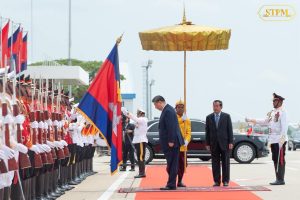Chinese President Xi Jinping has delivered Cambodia a swag of contracts, which the government in Phnom Penh hopes will shore-up an economy that has struggled ever since the COVID-19 pandemic and been mired by issues ranging from organized crime to difficult relations with the West.
In particular, the proliferation of scam compounds and human trafficking in Cambodia by Chinese criminal syndicates, commanded priority. There was speculation that continued funding from China – to the tune of $31 billion over the past 13 years – was at risk until the issue had been brought under control.
To that end, Xi and Cambodian Prime Minister Hun Manet committed to strengthening coordination and law enforcement cooperation to combat cross-border crimes, including illegal cross-border gambling, drug smuggling, human trafficking, and scams compounds.
Thirty-seven documents covering many sectors – including investment, trade, education, finance, media, youth affairs, agriculture, health, water resources, tourism, women’s affairs, and de-mining following cuts to funding from USAID – were signed during Xi’s visit to Cambodia, his first since 2016.
Five agreements covered funding for the contentious 174-kilometer Funan Techo Canal, which had stalled over costs. The canal was just one of a slew of big ticket infrastructure projects on the planning boards that had failed to gain any traction over recent years.
Xi’s tour also mattered on several other fronts. His two days in Phnom Penh were part of a wider regional “charm offensive,” also including stops in Vietnam and Malaysia, and came on the heels of U.S. President Donald Trump’s hefty tariff regime imposed on China.
Xi’s Southeast Asia excursion was all about unfinished business that had to be tended to and enlisting Southeast Asian countries to stand together in the face of external economic shocks, as China settles into what promises to be a long, drawn-out trade war with the United States.
In Cambodia, there was also a dire need to end the uncertainty over funding. Phnom Penh has developed a heavy reliance on Chinese money in recent years and moved firmly into Beijing’s orbit as a proxy within ASEAN and as a strategic ally through its Ream Naval Base.
“We must work together to promote the steady and sustained progress in building the China-Cambodia community with a shared future in the new era,” Xi said. “Cambodia is a priority in China’s neighborhood diplomacy.”
This included a collaboration between their armed forces. Both sides agreed to maintain frequent exchanges and increase cooperation in training and joint exercises in emergency rescue and disaster relief while improving medical and logistic services.
And there was a predictable designation of 2025 as “Cambodia-China Year of Tourism” which might signal a return of much needed Chinese tourists. In recent years, visitors from China have been frightened off by the human traffickers, as exemplified in the movie “No More Bets.”
“The great Chinese and Khmer civilizations have flourished together, inspiring each other through centuries,” Xi said after meetings with King Norodom Sihamoni, Prime Minister Hun Manet, and his father, the former prime minister Hun Sen.
As is often the case with Chinese contracts, the exact details of the new agreements – how much, deadlines and details on the spending – were not released but Beijing has a strong record of finishing projects in Cambodia where its influence is now overarching.
It was a point made clear by Xi, who raised more than eyebrows by arriving on April 17, a sensitive time in Cambodia. It’s one day after Khmer New Year holidays and, importantly, the 50th anniversary of the day the Chinese-backed Khmer Rouge swept into Phnom Penh.
Sources close to the ruling Cambodian People’s Party (CPP) were at pains to stress Xi’s arrival on the anniversary of Pol Pot taking power “was just a coincidence.” Others scoffed at that notion, saying the idea the date went unnoticed belied the high caliber of China’s Ambassador Wang Wenbin, who knows better.
“There’s two ways of looking at this,” another CPP source said. “I can understand why some people are annoyed and believe it is insensitive of the Chinese to schedule his arrival on this day.
“But it could also be seen as a sign that the half century legacy of the Khmer Rouge is over, relations have been normalized for quite some time and now both countries are just getting on with what needs to be done.”
The Khmer Rouge left a third of Cambodia’s population dead and maintained a civil war that lasted until the end of 1998. Four years later, China wrote-off debts incurred by the Khmer Rouge, signaling a fresh start in diplomatic ties was in the offing.

































